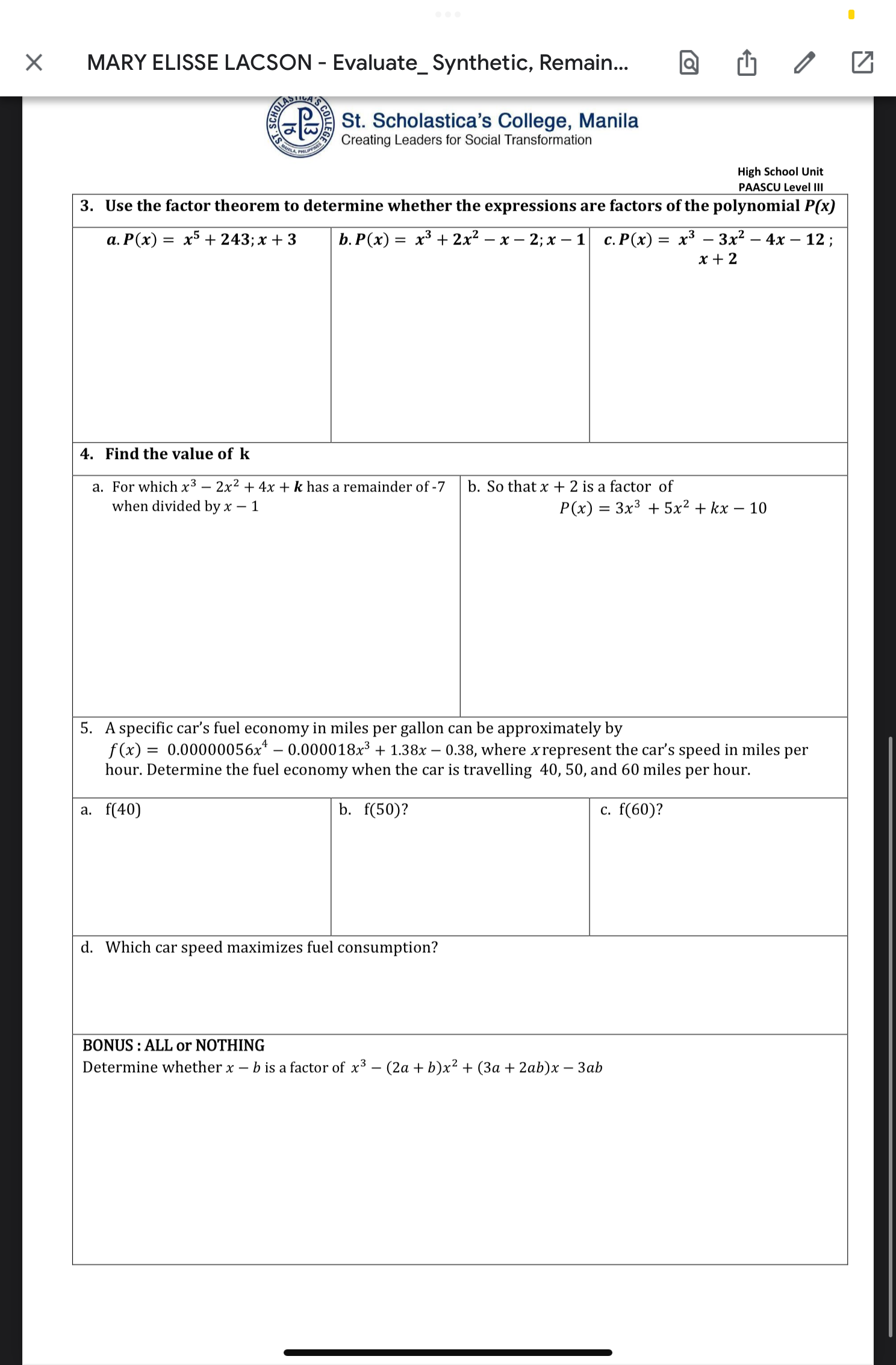1. Use the factor theorem to determine whether the expressions are factors of the polynomial P(x). a. P(x) = x^5 + 243; x + 3 b. P(x) = x^3 + 2x^2 - x - 2; x - 1 c. P(x) = x^3 - 3x... 1. Use the factor theorem to determine whether the expressions are factors of the polynomial P(x). a. P(x) = x^5 + 243; x + 3 b. P(x) = x^3 + 2x^2 - x - 2; x - 1 c. P(x) = x^3 - 3x^2 - 4x - 12; x + 2 2. Find the value of k. a. For which x^3 - 2x^2 + 4x + k has a remainder of -7 when divided by x - 1 b. So that x + 2 is a factor of P(x) = 3x^3 + 5x^2 + kx - 10 3. A specific car's fuel economy in miles per gallon can be approximately given by f(x) = 0.0000056x^4 - 0.000018x^3 + 1.38x - 0.38, where x represents the car's speed in miles per hour. Determine the fuel economy when the car is travelling 40, 50, and 60 miles per hour. a. f(40) b. f(50)? c. f(60)? d. Which car speed maximizes fuel consumption? BONUS: ALL or NOTHING Determine whether x - b is a factor of x^3 - (2a + b)x^2 + (3a + 2ab)x - 3ab.

Understand the Problem
The question is asking to apply the factor theorem to determine whether specific expressions are factors of given polynomials, find a value of 'k' for specific polynomial conditions, and calculate fuel economy based on a given function for different speeds. Additionally, it includes a bonus problem related to the factorization of a polynomial.
Answer
1. $x+3$ is a factor. 2. $x-1$ is a factor. 3. $x+2$ is not a factor. 4. $k=-10$. 5. $k=-7$. 6. Evaluate $f(40)$, $f(50)$, $f(60)$ for fuel economy. 7. Analyze $f(x)$ for maximum consumption.
Answer for screen readers
- $x + 3$ is a factor.
- $x - 1$ is a factor.
- $x + 2$ is not a factor.
- $k = -10$.
- $k = -7$.
- Fuel economy values:
- $f(40)$: Evaluate it.
- $f(50)$: Evaluate it.
- $f(60)$: Evaluate it.
- Analyze $f(x)$ to find the maximum consumption.
Steps to Solve
-
Use the Factor Theorem for Expression a
To check if $x + 3$ is a factor of $P(x) = x^5 + 243$, substitute $x = -3$ into $P(x)$:
$$ P(-3) = (-3)^5 + 243 = -243 + 243 = 0. $$
Since the result is $0$, $x + 3$ is a factor. -
Use the Factor Theorem for Expression b
To check if $x - 1$ is a factor of $P(x) = x^3 + 2x^2 - x - 2$, substitute $x = 1$:
$$ P(1) = 1^3 + 2(1^2) - 1 - 2 = 1 + 2 - 1 - 2 = 0. $$
Since the result is $0$, $x - 1$ is a factor. -
Use the Factor Theorem for Expression c
To check if $x + 2$ is a factor of $P(x) = x^3 - 3x^2 - 4x - 12$, substitute $x = -2$:
$$ P(-2) = (-2)^3 - 3(-2)^2 - 4(-2) - 12 = -8 - 12 + 8 - 12 = -24. $$
Since the result is not $0$, $x + 2$ is not a factor. -
Finding k for Expression a
For the polynomial $x^3 - 2x^2 + 4x + k$, we need it to have a remainder of $-7$ when divided by $x - 1$:
$$ P(1) = 1^3 - 2(1)^2 + 4(1) + k = 1 - 2 + 4 + k = 3 + k. $$
Set this equal to $-7$:
$$ 3 + k = -7 \implies k = -10. $$ -
Finding k for Expression b
For $x + 2$ to be a factor of $P(x) = 3x^3 + 5x^2 + kx - 10$, substitute $x = -2$:
$$ P(-2) = 3(-2)^3 + 5(-2)^2 + k(-2) - 10. $$
Calculate:
$$ P(-2) = 3(-8) + 5(4) - 2k - 10 = -24 + 20 - 2k - 10 = -14 - 2k. $$
Set this equal to $0$:
$$ -14 - 2k = 0 \implies 2k = -14 \implies k = -7. $$ -
Calculating Fuel Economy for Different Speeds
Fuel economy function:
$$ f(x) = 0.00000056x^4 - 0.000018x^3 + 1.38x - 0.38. $$
Substitute $x = 40, 50, 60$ respectively into the function:- For $f(40)$: $$ f(40) = 0.00000056(40)^4 - 0.000018(40)^3 + 1.38(40) - 0.38. $$
-
For $f(50)$:
$$ f(50) = 0.00000056(50)^4 - 0.000018(50)^3 + 1.38(50) - 0.38. $$ -
For $f(60)$:
$$ f(60) = 0.00000056(60)^4 - 0.000018(60)^3 + 1.38(60) - 0.38. $$
-
Maximizing Fuel Consumption
To find which speed maximizes fuel consumption, analyze $f(x)$ over the interval of interest (suitable derivative and testing critical points).
- $x + 3$ is a factor.
- $x - 1$ is a factor.
- $x + 2$ is not a factor.
- $k = -10$.
- $k = -7$.
- Fuel economy values:
- $f(40)$: Evaluate it.
- $f(50)$: Evaluate it.
- $f(60)$: Evaluate it.
- Analyze $f(x)$ to find the maximum consumption.
More Information
Using the factor theorem helps to simplify polynomial expressions and find factors efficiently. Fuel economy can often vary with speed.
Tips
- Forgetting to simplify the polynomial accurately when substituting for the factor theorem.
- Miscalculating the powers in polynomials when evaluating $f(x)$.
- Not checking the derived results to ensure they fit the conditions given.